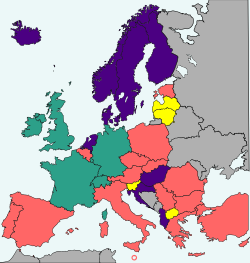London Agreement (2000)
| Agreement on the application of Article 65 of the Convention on the Grant of European Patents | |
|---|---|

Parties without any translation requirements
Parties requiring translation of the claims in the official language of the State under consideration
Parties requiring the description in English, and the claims in the official language of the State under consideration
European Patent Convention parties, which are not parties to the Agreement
|
|
| Signed | 17 October 2000 |
| Location | London, United Kingdom |
| Effective | 1 May 2008 |
| Condition | ratification by eight states (including Germany, France and the United Kingdom) |
| Signatories | 10 |
| Parties | 21 |
| Depositary | Government of the Federal Republic of Germany |
| Languages | English, French and German |
The London Agreement, formally the Agreement on the application of Article 65 of the Convention on the Grant of European Patents and sometimes referred to as the London Protocol, is a patent law agreement concluded in London on 17 October 2000 and aimed at reducing the translation costs of European patents granted under the European Patent Convention (EPC). The London Agreement is an optional agreement between member states of the European Patent Organisation.
The London Agreement entered into force on 1 May 2008.
Before 1 May 2008, once a European patent was granted or more precisely within three months (or six months for Ireland) from the date of grant, the patent had to be translated into an official language of each country in which the patentee wanted patent protection. If the translation of the European patent was not provided to the national patent office within the prescribed time limit, the patent was "deemed to be void ab initio in that State." This situation still applies in the Contracting States wherein the Agreement has not entered into force.
This situation led to high translation costs for patent holders, reduced the incentives to apply for a European patent and, many argued, the situation was a burden on the competitiveness of the European economy, compared to the situation in the United States (see also EU's Lisbon Strategy).
The agreement provides that Contracting States that have an official language in common with an official language of the European Patent Office, i.e. English, French or German, no longer require translation of European patents into one of their official languages. Other contracting states have to choose one of the official languages of the EPO as a "prescribed language," in which European patents have to be translated in order to enter into force in their country. They however keep the right to require translation of the claims in one of their official languages.
...
Wikipedia
